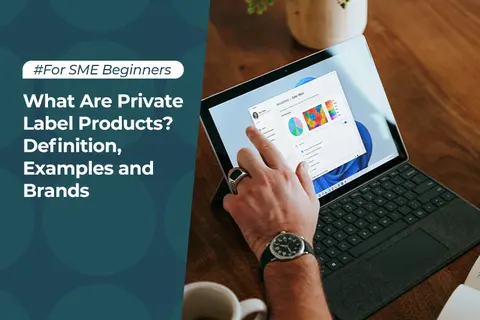What Are Private Label Products? Definition, Examples and Brands

Table of Contents
Starting an eCommerce business doesn't always mean you must produce your own goods. While sourcing, storing, and shipping products can be expensive, there are ways to save resources, especially at the beginning.Each option has its pros and cons, so it's essential to research and choose the one that suits your needs. Whether to manufacture your own products depends on factors like budget, business model, and desired control over quality.Now, let's explore what it means to sell private label products, how to find a reliable manufacturer, and other options for your eCommerce business.
What Is Private Labeling?
Private labeling is when brands get products made by another company and put their own label on them for sale. This means the brand doesn't make the product itself; it's made by a different company, which is much similar with white labeling products. You might not realize it, but private labeling is pretty common nowadays.
According to the Private Label Manufacturers Association, about 30 percent of new sales in the US retail industry come from store brands.Private labeling is a smart move for businesses, says Sara Nesbitt, CEO of Coastal Carolina Soap Co. It lets businesses sell products under their own brand that they couldn't make themselves.
Rob Terenzi, co-founder of Vega Coffee, says private labeling can also mean using parts made by another company to improve your product without saying where they came from.
Private Label Brands
A private brand is a product made specifically for a store and sold under its name, rivaling famous brands. Think of it like the store's own version of popular items. These are often called "private label" or "store brand" products. They usually cost less than big-name brands. For example, if you go to a supermarket, you might find their own brand of cereal next to the well-known ones. The store can make more money from selling their own brand because they don't have to pay as much to the big companies behind the famous brands.
How a Private Brand Works
Private branded goods are typically produced by outside manufacturers, sometimes even on the same production lines as other brands. They might just have different labels or be completely original products. Private branding is a smart way to make products without having to build big factories, hire designers, or set up a special supply chain. It's like when a store sells its own brand of chips alongside famous ones by online wholesale marketplace. They can offer a variety of private label products that appeal to shoppers looking for a good deal as well as those willing to pay more for premium quality.
Example of a Private Brand
Private brands are common in most retail stores, particularly supermarkets, where you'll often find multiple private labels. For instance, supermarkets may have budget-friendly private or generic brand items alongside premium private brands. Some supermarkets even offer organic-only private brand options. These products are usually displayed together on the same shelves, giving customers a variety of choices to suit their preferences and budgets.
Private Label Examples
To gain deeper insights into the effectiveness and possibilities of private labeling, let's delve into some case studies and examine notable manufacturers behind some of the most thriving private label brands. By studying real-world examples and recognizing the key players in this field, we can grasp the impact and opportunities that private labeling offers.
AmazonBasics by Amazon
Amazon has used its large number of customers to make AmazonBasics a well-known name. The brand sells lots of everyday items, like gadgets and household stuff or our clothes, and is known for being cheap through comparing the best websites for cheap clothes. What makes AmazonBasics so smart is how it looks at what customers want and then offers good-quality, low-cost options to fill those needs. It's a great example of how to do private labeling right.
Great Value by Walmart
Walmart's Great Value brand is one of the most well-known private label brands in grocery stores. It offers a wide range of products, from basic pantry items to frozen foods. What makes Great Value stand out is its focus on providing good quality at affordable prices. By being smart about where they get their products and how they manage their supply chain, Walmart can offer items that are just as good as big-name brands but cost less for shoppers.
These successful private label brands show us what's possible when companies think carefully about private labeling. They prove that by balancing quality, price, and how they manage their brand, private labels can become really popular and even boost the store's overall reputation.
Popular private-label manufacturers
-
Chovm: This huge website has made it super easy to find products from around the world. It connects brands with manufacturers who can make the products they want. You can find everything from electronics to kitchenware and beauty products on Chovm.
-
Wholesale2b: This online company gives you access to a list of top dropshipping suppliers. Dropshipping means the manufacturer takes care of shipping the products, so you don't need to worry about having warehouse space or hiring people to handle shipping.
-
Worldwide Brands: Established in 1999, Worldwide Brands researches third-party manufacturers and shares their details with subscribers. This directory helps you choose the right private-label manufacturer for your needs.
Conclusion
If you want to stand out in eCommerce, consider private label products instead of white labeling or wholesale. Private labeling lets you add your own unique touch to products and offer them to customers at a competitive price. It's a great way to build a stronger brand and set yourself apart from competitors while also increasing profits.To take your business to the next level, prioritize the post-purchase customer experience with WeSupply! Our platform offers various solutions, including predicting order delivery, order tracking, post-purchase notifications, and easy returns.
Start your borderless business here
Tell us about your business and stay connected.
Keep up with the latest from Chovm.com?
Subscribe to us, get free e-commerce tips, inspiration, and resources delivered directly to your inbox.















